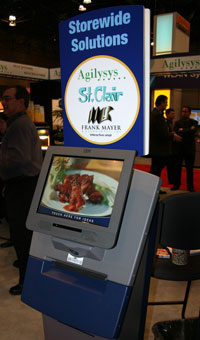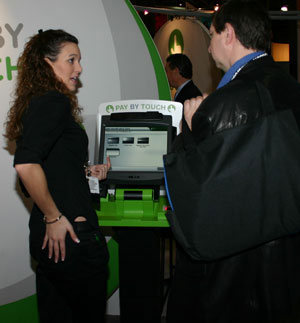Article
Big Show ends, big year for self-service begins
The NRF's Big Show was a big venue for next-gen self-service technology. Companies flaunted new kiosks, portable retail management devices, cardless loyalty programs and plug-n-play software. And many sang the same tune: Self-service is taking off in '06.
January 30, 2006
From Microsoft to MobileLime, companies big and small sought to sell self-service at the National Retail Federation's 95th Annual Convention and Expo, held Jan. 15-17 at New York City's Jacob Javitz Convention Center. 15,000 conventioneers perused the latest solutions from 400 vendors, presenting everything from ergonomic flooring to RFID fork lifts.
Here are some highlights:
Agilysys's grocery kiosk, built in partnership with Symbol, Frank Mayer and Associates and St. Clair Interactive for grocery chain Giant-Carlysle, integrates ordering, loyalty and marketing applications; among them, software to instantly compare the individual's purchase records, referenced from his or her loyalty card, to current product specials. The system can display current specials that records indicated the customer might want. If the customer selects one on the Symbol touchscreen, the machine shows a map with directions to the product's shelf location.
Control Module, a 30-year-old biometric company originally in the barcode business, flaunted its line of fingerprint recognition devices. When paired with Cetec's self-service human resources software, Control Module's systems can store employee fingerprints, track and control their door, computer or machine access, send them personalized messages, and automate typical HR activities - like tracking tardiness or enabling vacation scheduling. Its Windows-based Touchtime units, deployed in high-security environments like the Wynn Las Vegas resort casino, enable users who don't otherwise have windows workstation computers to view employee records, and even 401(k) portfolios.
 |
| The Agilysys grocery kiosk, built in partnership with Symbol, Frank Mayer & Associates and St. Clair Interactive |
Fujitsu Transaction Systems Inc. made several announcements on Monday. According to news releases, Fujitsu contracted with ThingMagic Inc. to resell and service ThingMagic's RFID tags and Mercury4 readers. Fujitsu also announced its Pervasive Retailing Framework to create real-time interoperability between retail software systems, including legacy network software. And Fujitsu partnered with Vertical Communications, Inc. to develop a point-of-sale Internet telephone on Fujitsu's TeamPoS family of terminals, for back-office and management applications.
Hand Held Products Inc. showed a different kind of software innovation - providing a flexible integrated kiosk platform with source code, letting end-users such as storeowners customize it themselves, rather than having to pay for developing specially made software.
"It streamlines integration time," said Nick Daddabbo, Hand Held's senior product manager of transaction terminals/kiosks. "Instead of having to come to us, they can just kind of block it out themselves."
TouchTunes showed TouchTunes PRO, a wireless wall-hanging, flat-screen music kiosk that lets store customers choose their own music from lists controlled by the store. The 19-inch touchscreens demonstrated a variety of trendy music choices from Moby to John Mayer. They are currently deployed at Fossil stores, among others.
Microsoft sponsored much of X06, the Big Show's self-service bistro of the future, including a demonstration by Iron Chef Mario Batali. Microsoft was ubiquitous across the show floor, with a slew of software providers showing new software developed for their CE and Embedded operating systems. Among them, Hand Held Products, Inc. and RMS-Touch announced the RMS-Kiosk suite of self-service applications developed on CE, and Experticity's release of LiveSupport 2.0, a real-time video customer information system for kiosks, built on the .NET framework. Microsoft touted Embedded at their own booth, and the Embedded Partners Program, a network of Embedded users developing new systems cooperatively.
MobileLime, a young company offering cell phone-based alternatives to loyalty and debit cards, demonstrated a system that, among other things, allows customers to bypass pharmacy counter lines by paying through their cell phones.
NCR, meanwhile, demonstrated its adaptable EasyPoint hardware in a variety of incarnations. The tiny new FastLane Mini, built to save space and offer full cash/card payment functionality, sports a flexible software package that allowed experienced customers to start the transaction instantly, by scanning an item rather than touching a screen, while still providing real-time video instruction for FastLane first-timers. On the back end, the Mini offers remote manager monitoring via handheld remote assistant, rather than requiring a store employee to supervise the units from a fixed-position kiosk.
OnScreen Technologies, a young publicly traded company, showed a self-service twist on a traditional technology. The company's digital LED signs can be changed via wireless connection, or set to rotate messages according to traffic flow at store peak times. On Screen is also developing software for integrated remote management EDAs. They were also foldable, lightweight and inherently self-cooling - without the aid of fans. Rumor has it that On Screen is testing more products specifically for kiosk deployments.
 |
| Pay by Touch demonstrated its SmartPay biometric payment system. |
Pay by Touch demonstrated its new SmartPay, a biometric kiosk system recently deployed at Green Hills Farm Stand, a high-volume independent grocer in Syracuse, NY. The system allows customers to associate a card or account number, and loyalty programs, with encrypted templates - not full prints - of their fingers. Shoppers can then self-checkout without payment or loyalty cards. On Monday, Pay by Touch also announced the purchase of rival BioPay LLC for $82 million in stock and cash.
Retaligent Solutions Inc. showed its new Clarience 1:1 gift registry, which lets customers manage multiple lists for different events, and allows web access. Customers can scan gift wishes in the store with a handheld portable shopping system. Retaligent CEO Bryan Amaral also demonstrated the company's barcode breakthrough - the ability to scan them with a cell phone macro lens. And their eSP 1:1 Clienteling Software allows shoppers in fitting rooms to use barcode-scanning micro kiosks to browse alternative sizes, styles and accessories, with photographs. When used in conjunction with their mobile management system, shown on Symbol's portable EDA units, the customer could then page an employee to bring other items to the fitting rooms.
Retail Anywhere, a long-time POS software developer, announced its jump into kiosk software sales at The Big Show. Marketing manager Brenda Whisenhunt touted the platform's easily integrated ARTS 4.01 data modeling. Retail Anywhere's touch interface included a gift registry, running ad ticker and video advertising capabilities while in-use. Whisenhunt said Retail Anywhere consulted with their pre-existing POS clientele on the new platform's design, which used big buttons, simple text and friendly interfacing to guide the consumer.
"It's a way to increase sales," she said. "Because there's all kinds of suggested alternative selling. The thing with the kiosk, too, we've ported to the IBM Anyplace. It can go by a door, it can go in an aisle. We're really trying to focus on customer-enhanced solutions."
Symbol hosted a two-story booth replete with self-service solutions and crowds of end-users fixated upon them. In conjunction with Vue Technology, Symbol showcased a semi-real-time, RFID-enabled, inventory control network in its "Store of the Future." The system tracks individual products, tagged with RFID, from warehouse to POS. Used in full, the system can track items loaded onto RFID scanning fork lifts, into store back rooms equipped with their DC 600 RFID portal system, across RFID "smart shelves" and into customers' hands. The system relays scanned data back to its Intelimanager tracking software which, Vue spokesman David Nesbitt said, could literally update inventory minute-by-minute - rather than the infrequent, inaccurate manual processes commonly in use. Major retailers, including Best Buy, test marketed the system. Symbol and Vue plan to see commercial deployments in 2006.






